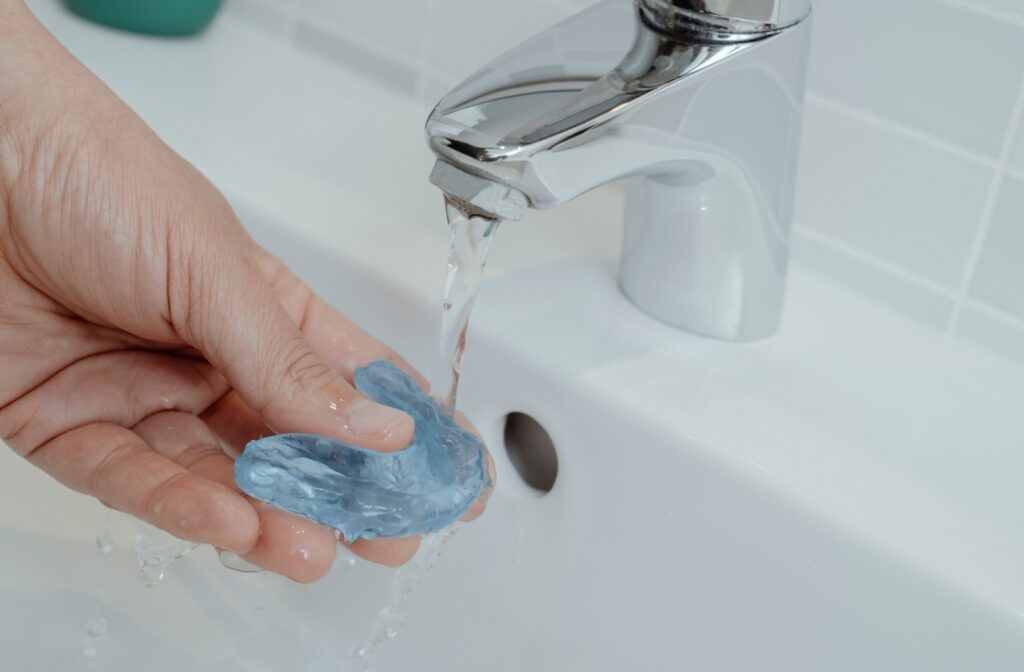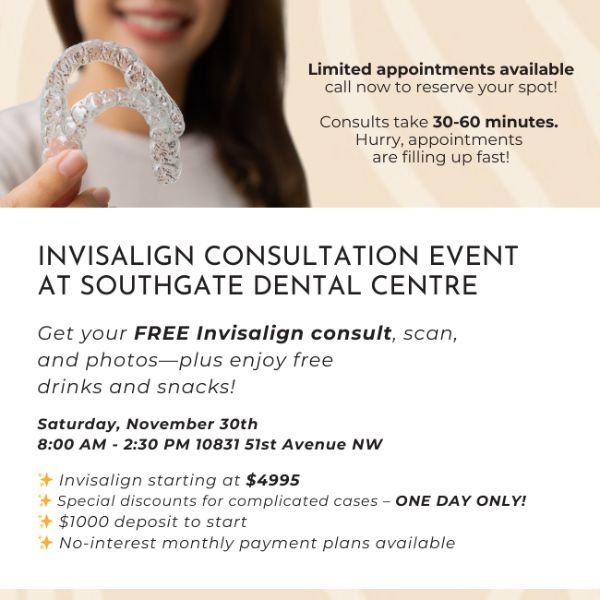Your teeth are important, which is why you should always take care of them.
If you grind your teeth at night, stressfully clench your jaw during the day, or love to stay active playing sports, there’s a simple answer to protecting your teeth—wearing a mouthguard, nightguard, or splint!
Regularly cleaning your mouthguard is crucial for maintaining your dental health. You should regularly rinse the mouthguard, then use a non-abrasive toothpaste, to scrub it free of any bacteria. This way, you can keep using the mouthguard without putting your oral health at risk.
It’s important to note, do not boil or put your appliance in the dishwasher or it will distort.
Your dentist can recommend a mouthguard right for you.
Why Should You Wear a Mouthguard?
Mouthguards are a lot more than just a piece of shaped plastic. They’re a piece of equipment that protects you against all kinds of potential injuries. They can cushion a blow to the face, act as a barrier in case you fall, and keep teeth aligned and protected.
There are primarily 2 types of mouthguards:
- Sports mouthguards—designed to be worn whenever you’re involved in a high-impact activity
- Nightguards/Splint—designed to be worn while you sleep to prevent damage due to teeth grinding or clenching
Essentially, a mouthguard distributes force over a large area, significantly reducing its overall effect. This helps prevent major damage to your teeth in a simple, non-invasive approach.
Are Mouthguards Worth It?
Mouthguards can be an extremely efficient way to protect your teeth. They’re a preventative measure that can be much cheaper than repairing any significant damage to your mouth. However, it’s not just about the financial side of things.
Constant teeth grinding, called bruxism, can cause major damage to your teeth and jaw over time, such as:
- Worn-down teeth
- Cracked or broken teeth
- Jaw pain and discomfort
- Headaches
And meanwhile, playing sports without a mouthguard puts you at risk of chipping, or even knocking loose, your teeth. By simply wearing a mouthguard, you can help avoid these issues and keep your teeth healthy and strong.
Why Is It Important to Clean a Mouthguard?
Even if you regularly brush your teeth and use mouthwash, your mouth is full of bacteria. They aren’t all bad; some are even beneficial for keeping your mouth healthy. However, when you wear a mouthguard—especially overnight—these bacteria can quickly build up and stick to the mouthguard.
This can create a breeding ground for bacteria, yeast, and mould, leading to unpleasant odors, tastes, and even infections if you aren’t careful. This is why it’s so crucial to regularly clean your mouthguard. It prevents potential problems while preserving the lifespan of your device, letting it stay effective for longer.
So how do you properly clean your mouthguard?

Properly Cleaning Your Mouthguard
To keep your mouthguard in top condition, follow these steps:
- Rinse it immediately after removal. Use cold water to rinse away any debris and prevent bacterial growth.
- Clean the mouthguard with non-abrasive toothpaste and water. Make sure the water isn’t too hot; this can warp the plastic.
- Use a soft-bristled toothbrush or a denture brush to gently brush the entire surface.
- Allow the mouthguard to air-dry completely before storing it. This is crucial for preventing the buildup of mould.
- Or soak your mouthguard in mouthwash to help clean and give it a refreshing minty taste.
- Store the mouthguard in a clean, well-ventilated case to protect it from contamination and other types of damage.
At least once a week, think about using a specific mouthguard or denture cleaning solution or tablet. This helps deep-clean and disinfect the surface, removing any residual contaminating particles.
Knowing When to Replace Your Mouthguard
No matter how well you maintain your mouthguard, you’ll need to replace it at some point. Every time you handle it, give a quick inspection for:
- Holes
- Tears
- Cracks
- Any signs of visible damage
If you notice any of these signs, or if the mouthguard becomes loose-fitting, it’s time to replace it. If your mouthguard doesn’t fit properly, it can’t properly protect your teeth—so you should talk to your dentist to get a new one.
Where to Get a Mouthguard
A mouthguard is a simple but effective way to protect your teeth. Whether you love sports, work in a high-impact area, or simply grind your teeth, come talk to our team at Southgate Dental Centre. We’re here to help keep your teeth safe, so schedule an appointment with us today!



